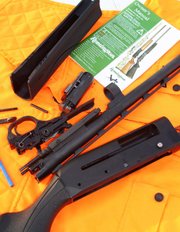One year after it was announced, the new Remington V3 shotgun is finally on the market, and it feels like a winner.
Explaining the V3 requires visiting its big brother, the Remington Versa Max, a semi-automatic shotgun that Remington introduced in 2010.
Capable of shooting light 23/4-inch target loads to the heaviest 31/2-inch turkey and waterfowl loads, the Versa Max was the latest in Remington's attempts to modernize its presence in the shotgun market.
Despite a recall and a hefty price tag, the VersaMax earned a loyal and cultish following. In 2013, Remington introduced the Versa Max Sportsman, a cheaper, less adaptable and less corrosion-resistant version of the original.
I used the Versa Max Sportsman for a year, and it was indestructible. I never cleaned it after a year of intensive dove and duck hunting, but it cycled anything I fed it.
The Versa Max's disadvantages are its weight and balance. Its 31/2-inch chamber also stretched my arms too far to shoot the gun accurately.
These are all common complaints about the Versa Max, but Remington corrected them with the V3, a new model that shares no internal parts with the Versa Max.
Remington introduced the V3 in February 2015. Members of the shooting media gushed over V3 prototypes then, but the the V3 did not ship until February 2016.
Currently the V3 is available only in 12-gauge. I bought one with a low four-digit serial number from a locally owned sporting goods store.
Mine is black with a black synthetic stock. That is the cheapest model, but you can also get it in Mossy Oak, Shadow Grass or Blades camo, or in walnut.
Unlike the Versa Max, the V3 is chambered only for 23/4- and 3-inch shells. The receiver is shorter than that of the Versa Max, which shortens the length of reach. That gives the perception of shortening the length of pull, even though its 14.25-inch LOP is the same as the Versa Max.
The V3 comes to the shoulder sure and square, and my eyes align instantly to the end of the ribbed barrel, even when I'm wearing my duck hunting parka over multiple layers.
Like the Versa Max, the V3's heart is its VersaPort gas system, which regulates gas pressure based on the shell length. It is similar to Beretta's Argo system.
Traditional autoloaders divert propellant gases through two ports drilled way down the barrel into a complex and heavy spring-loaded piston connected to action bars.
The V3 lacks all those moving parts. The gas system consists of a single gas block beneath the chamber that houses two short, slender pistons.
There are eight ports in the barrel near the breech, compared to seven ports in a Versa Max barrel. A 23/4-inch shell exposes all eight ports in the V3. This vents the proper amount of gas into the pistons to cycle light loads.
A 3-inch cartridge covers four ports. This regulates the amount of gas from the more powerful charge, lengthening and flattening the cycling curve. Theoretically, that should reduce felt recoil, but it does not. With every load I tested, the V3 kicks noticeably harder than a Versa Max, a Remington 105 CTi or a Winchester SX3.
Gas depresses the twin pistons just far enough to cycle the action. Valves inside the pistons open and vent the remaining gas out the forearm.
Carbon deposits on the magazine tube do not affect the actionas they do on traditional gas guns.
The ports are inaccessible, but Remington claims they are self-cleaning. My experience with the Versa Max gives me no reason to question that claim.
Unlike the Versa Max, the V3's return springs are inside the receiver. There is no recoil spring inside the stock to rust and break. You can paddle a boat with a V3 with impunity.
This also eliminates the long push rod and plunger assembly that work the recoil sprinhg insidetraditional gas guns. The only external hardware is the cocking mechanism.
The V3 has a camming bolt head with two broad lugs for a tight lockup. It also has a very long, beefy extractor and ejector assembly.
There are no decorative touches on the V3. The attractive, green foil "R" on the Versa Max grip cap is replaced by a spartan "R" molded into the V3's grip.
The safety pin has a large black disc on the "safe" side, and the pin shows red on the "live" side. Panels on the forearm and grip are textured for better handling.
Another important difference between the V3 and Versa Max is the barrel. The V3 has a Light Contour ribbed barrel with twin beads, like that of the Remington Model 11-87. It comes with three Rem Chokes in Improved Cylinder, Modified and Full. The Versa Max has a proprietary barrel with ProBore chokes.
One nice V3 feature is a magazine cutoff at the end of the loading ramp.
I handled V3s with 26- and 28-inch barrels. The 28-inch version felt a bit front-heavy, but the 26-inch barrel is extremely well balanced and points like a finger. The beads on my rib are misaligned, but it won't factor in the field because I don't see the beads when I shoot at moving targets.
The overall length of a V3 with a 26-inch barrel is 47 inches, and 49 inches with a 28-inch barrel. The Drop at comb is 11/2 inches, and the drop at heel is 2 7/16 inches. With a 28-inch barrel it weighs 7 pounds, 4 ounces. A little less with the 26-inch barrel.
The Versa Max has the same dimensions, but the the Versa Max is almost a full inch longer with either barrel and 8 ounces heavier.
The difference is noticeable.
Sports on 03/27/2016



